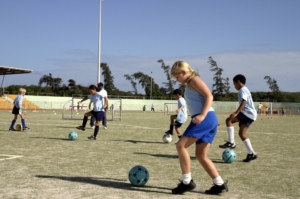 As any sports parent knows, it’s often a challenge to get your kids to the practice field, court, course, hill, or what-have you every day on time and ready to go. I admit that I can be a bit of a taskmaster with my own kids (who’s main sport is ski racing) on those days when they’re dragging their feet. I will also admit that this ‘forced’ approach is a source of some irritation for my wife who believes (as I do to a lesser degree) that kids need downtime to rest and recovery from their busy weekdays filled with school and extracurricular activities.
As any sports parent knows, it’s often a challenge to get your kids to the practice field, court, course, hill, or what-have you every day on time and ready to go. I admit that I can be a bit of a taskmaster with my own kids (who’s main sport is ski racing) on those days when they’re dragging their feet. I will also admit that this ‘forced’ approach is a source of some irritation for my wife who believes (as I do to a lesser degree) that kids need downtime to rest and recovery from their busy weekdays filled with school and extracurricular activities.
My wife and I are also generally in agreement on not pressuring our children to do anything beyond their school and home responsibilities. We believe in allowing them to find and follow their own passions and interests. At the same time, I must also admit that I want our daughters to grow up to be good athletes and to instill the value of physical activity.
I began to ponder more deeply what I wanted our girls to get out of their athletic experiences and I realized that, though I do want them to become good athletes, there are far more important things I want them to gain from their sports participation that they can’t readily get at our home in Mill Valley, California.
Though our focus is in the sport of ski racing, my ideas apply to any youth sport that your children may participate in, whether soccer, basketball, tennis, golf, football, lacrosse, running, triathlon, the list goes on. Gosh, my ideas are also relevant to other achievement activities such as chess or any of the performing arts.
In my musings, I came up with Four Reasons Why Your Kids Should Play Sports.
Commitment
The ability to commit to something is fundamental to success in every aspect of life, whether sports, school, career, or relationships. Getting up and out on weekend mornings when we’re at Sugar Bowl (where our girls are on the ski team) teaches that commitment to our girls. Additionally, the commitment isn’t just theirs, but rather it’s a family commitment as well. Sarah and I have made a substantial commitment of time, money, and energy to our skiing life based on our girls’ desires to be a part of the Sugar Bowl ski team. We also bought a second home in the mountains to support our lifestyle.
We make the commitment to pay the bills, take care of our girls’ equipment and gear, and get them where they need to go, whether training or races. Their commitment involves working hard, paying attention to their coaches, being good sports, and, importantly, expressing gratitude toward everyone who makes this experience possible.
Obviously, our girls could learn the lesson of commitment by participating in sports closer to home and for far less commitment of time and money on our parts. But we chose ski racing because skiing is a sport that both my wife and I love (plus, admittedly, I was an internationally ranked ski racer as a youth, work in the sport extensively, and have an immense passion for it) and also appreciate the opportunity to be in the mountains. And, it’s a sport that my wife and I can also participate in with your daughters.
Resilience
My daughters, like most children in our demographic, have a pretty easy life. Compared to generations past, they have few demands placed on them. Few children these days have to wake up at the crack of dawn to feed the chickens and milk the cows. Even fewer have to walk to and from school 10 miles uphill (in both directions!) in a snowstorm. And Mill Valley certainly doesn’t qualify as the ‘mean streets.’
Yet, resilience, that is, the ability to overcome challenges, adapt to changing situations, and bounce back from setbacks, is another essential contributor to success. So, where are my girls going get that resilience that they will certainly need as they grow into adults? Well, on the mountain skiing. The adversity children experience while skiing are many and varied. There is, of course, the weather, which can range from rain to high winds to bitter cold. My daughters were so proud of themselves a few weeks ago when they came off the hill after a full day of skiing in the rain. There are the snow conditions which can vary from ice to slush to deep powder. The terrain is another challenge that young racers face that can induce doubt and fear. When you add in a training or race course, another level of adversity is presented to kids that they must overcome. Finally, races immerse them a competitive world that provides clear evidence of success and failure and few excuses to fall back on.
Skiing is the one place in their lives where they can get out of their comfort zones in so many ways and emerge from it feeling, well, tough (in the first-world, suburban sense). These experiences elevate their confidence, boost their motivation, sharpen their focus, and, ultimately, prepare them for the inevitable challenges they will face in many aspects of their lives.
Opportunities for developing resilience in your children exist in every sport with different types of challenges, obstacles, and adversity.
Off the Streets (and their iPhones)
The way I see it, anything that keeps kids off the streets, however mean or benign they may be, is a big win for them and their parents. When I talk about the streets, I mean anything where bored children hang out because, in my view, wherever boredom goes, trouble follows. If kids are participating in sports, not only are they gaining wonderful physical, psychological, and social benefits, they are also not exposing themselves to peers or situations that are unhealthy.
Additionally, anything that keeps children away from their iPhones and other screens is also a big victory for everyone. The sad reality is that most children these days are hopelessly addicted to their screens and waste massive amounts of time on their iPhones, iPads, and the like. Though I see young athletes in all sports checking their phones far more than I would like while during practice, the happy reality is that they are so busy practicing that they simply don’t have time to get sucked down the black hole of screen time.
You can think of both as opportunity gains (the opposite of opportunity costs), which involve time spent doing something good for kids is time not spent doing things that are bad for them. In this case, time spent doing something healthy like sports is time not spent eating junk food, drinking or taking drugs, getting into trouble, or just plain mind numbing and time sucking as social media, video games, and TV.
Family Time
If you are like our family, much of your time at home is not usually time spent together. Though weekends should be devoted to that thing called family time, it rarely seems to actually happen. My wife is grocery shopping and running other errands and I’m working, paying bills, or doing things around the house. My kids are either in their rooms playing or running around outside. In other words, we aren’t doing family time.
As a sports family, our time in the mountains is very much family time. It begins when we pack up and head for the mountains. No doubt the drive can be a grind. At the same time, we are all together in a metal box for three or more hours during which we talk, play games, and share audiobooks. Once we arrive, it continues to be family time. Though our girls are with their training groups most of the days, we are with them for breakfast, lunch, and dinner. Plus, we often pull them out of ski team to ski as a family. And I can tell you that there is nothing that brings me more joy than skiing with Sarah, Catie, and Gracie.
Also, when we get back to our cabin near Sugar Bowl, Sarah and I don’t work or do errands. Rather, we take walks with the girls and our Aussie, Tule. We play games. We read books. Again, the kind of family time that we always envision, but rarely succeed at while home.
As with many sports, ski racing is not just an activity that our daughters participate in, but rather a lifestyle that every family member can participate in and enjoy. I know many families whose lives revolve around their children’s sports involvement and it becomes a center of their social universes.
As I noted in a recent post, being a sports parent can be a real bummer sometimes. At the same time, seeing the smiles on our girls’ faces after a day of skiing or when they cross the finish line of a race definitely balances out those tough times. When you add in the opportunities for my wife and I to enjoy skiing together or with friends is another big plus. And just being together as a family away from the ‘burbs and the rat race makes sports a lifestyle for which we are forever grateful. When you add these benefits to the life benefits I just described, it makes being a sports family a very attractive proposition.






